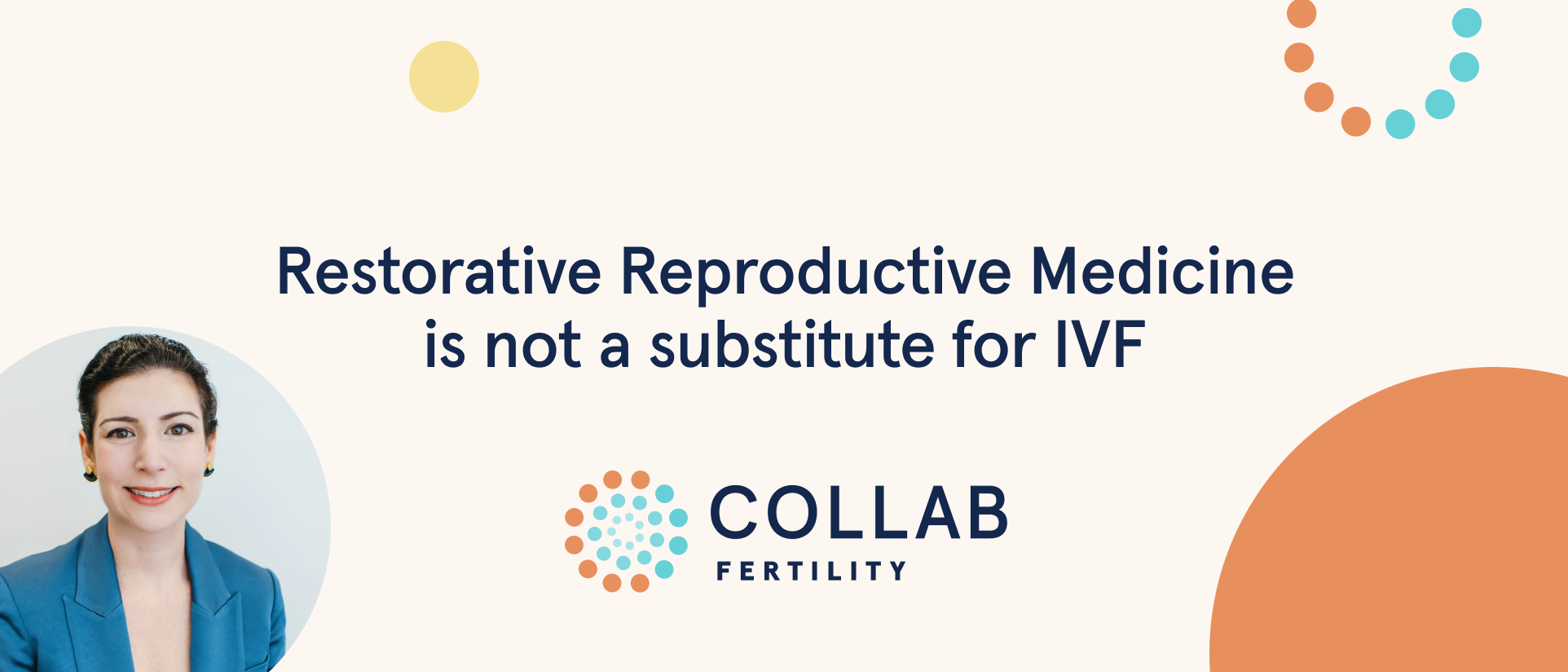
Restorative Reproductive Medicine isn’t a substitute for IVF
In her response to The Free Press, Dr. Thalia Segal warns against limiting families’ options through ideology
Have you heard about Restorative Reproductive Medicine (RRM) or NaPro technology (natural procreative technology)? These terms have become a flashpoint in the national conversation about reproductive care. In August 2025, the White House announced it was exploring RRM as an alternative to IVF. Soon after, several Republican lawmakers introduced bills to promote RRM and protect providers who do not offer IVF. Some states, including Arkansas, have already passed laws requiring insurance coverage for it.
Supporters describe RRM as a more “natural” approach, but critics, including Planned Parenthood—which has called RRM “junk science”—warn that it could be used to limit access to IVF and other evidence-based fertility treatments.
At Collab Fertility, we share these concerns. We believe patients deserve access to scientifically sound, compassionate, and effective reproductive care without political interference.
When the national publication The Free Press recently ran an article praising “natural alternatives” to fertility treatment, Collab Fertility founder Dr. Thalia Segal knew it was important to respond. As Dr. Segal has written before, this is more than a misleading narrative; it is dangerous. By rejecting IVF and other assisted reproductive technologies, RRM offers false hope, excludes entire groups of patients, including the LGBTQIA+ community, and risks delaying the only scientifically proven treatments that can help many people build a family.
In her letter to the editor, Dr. Segal explains why ideology should never take precedence over evidence-based medicine and why patients deserve access to the full range of safe, effective, and compassionate options.
Letter to the editor: Dr. Thalia Segal challenges NaProTECHNOLOGY and Restorative Reproductive Medicine
To the Editor:
Madeleine Kearns’ recent opinion piece offers a heartfelt account of her journey with undiagnosed endometriosis and the eventual birth of her child following excisional surgery. But beneath the surface lies a broader narrative — one shaped by the ideology of Restorative Reproductive Medicine (RRM), and its most prominent application, NaProTechnology.
Though not named explicitly, Kearns’ journey reflects the principles of RRM — a fertility philosophy rooted in Catholic moral teaching that rejects assisted reproductive technologies like IVF and IUI, regardless of clinical circumstance. While RRM encourages diagnosis and treatment of conditions like endometriosis and PCOS — which all fertility specialists support — it categorically excludes IVF because of religious doctrine.
Kearns implies that mainstream fertility care often skips diagnosis in favor of IVF. As a board-certified reproductive endocrinologist, I can say this is simply not true.
Standard fertility care begins with thorough diagnostics: medical history, hormone panels, imaging, and semen analysis. Like RRM, we treat root causes — PCOS, endometriosis, thyroid disease, and others — and IVF is not the first step. At Collab Fertility, we go even further, offering integrative support from day one: nutritional counseling, education on endocrine disruptors like microplastics, and wellness resources such as acupuncture and therapy. I believe in optimizing egg and sperm quality through lifestyle and targeted interventions — before IVF.
But for many patients, IVF is the only path to a family.
Kearns presents a narrow version of the endometriosis story. What if surgery found no disease? What if complications occurred — loss of an ovary, scarring, anesthesia risks? The literature shows that for unexplained infertility, 40 laparoscopies yield just one additional pregnancy (Marcoux et al., NEJM 1997). And for women with endometriosis who desire more than one child, excision carries risk. Endometriosis can recur, future surgeries may be needed, and cumulative damage to the ovaries can reduce ovarian reserve and hasten menopause.
Age remains the strongest predictor of fertility. At 35, Kearns had time on her side. But for patients over 38, ovarian reserve and egg quality decline rapidly. One of my patients underwent multiple surgeries for endometriosis and came to me for IVF at 39 with only one egg retrieved per cycle. Her chances of a healthy embryo were low, and she is now pursuing donor eggs — a path that might have been avoided had she pursued egg or embryo freezing prior to surgery.
IVF is not only a treatment; it is a proactive tool to preserve fertility. For those with progressive diseases like endometriosis, egg or embryo freezing offers a critical safety net.
Kearns implies that only NaPro-trained physicians can diagnose or treat endometriosis effectively. That’s misleading. Most academic and community hospitals have board-certified minimally invasive gynecological surgeons with extensive training in endometriosis management. In contrast, many OB/GYN NaPro providers are not fellowship-trained in minimally invasive gynecologic or reproductive surgery, and their surgical skill levels vary widely— which should give pause when evaluating complex gynecologic care.
That said, there are situations where surgery before IVF is medically appropriate. For patients with large endometriomas (especially >4 cm), dilated fallopian tubes, or deeply infiltrating disease that distorts pelvic anatomy, surgical intervention can improve IVF outcomes. For patients with severe, debilitating pain, excision surgery can be life-changing — and fertility may follow. But the decision to operate should be based on symptoms, disease extent, and family-building goals — not blanket philosophies. Surgery is a tool, not a moral imperative.
The article also neglects male factor infertility, which accounts for up to 40% of all infertility cases. NaPro’s approach, focused solely on female diagnostics and ovulation, is insufficient when motile sperm counts are low. Moreover, the RRM framework excludes entire populations from care. LGBTQ+ couples, single parents by choice, and anyone needing donor sperm, eggs, or gestational carriers are simply not accommodated in this model.
Kearns praises the treatment of PCOS with ovulation induction — specifically, letrozole. But this is standard, evidence-based practice at most fertility clinics, OB/GYN offices, and even some primary care settings. There is nothing novel about it.
Finally, a word of caution. I fully support the value of expert endometriosis surgeons like Dr. Puthoff. But surgery is not a magic bullet, nor should it be the only story told. Fertility is nuanced. Multiple factors — male, female, hormonal, anatomical, and age-related — intersect in complex ways. To present one path as universally superior and imply others are reckless or unethical is both inaccurate and potentially detrimental.
Let’s celebrate Kearns’ success, but also acknowledge the thousands of others whose journeys require different tools, including IVF. Personalized, evidence-based fertility care — not ideology — should guide treatment.
Thalia Segal, MD
Reproductive Endocrinologist & Infertility Specialist / Medical Director
Collab Fertility
The bottom line: why NaProTECHNOLOGY and RRM fall short of evidence-based fertility care
As Dr. Segal makes clear, fertility is complex, and no single philosophy or procedure can claim to be the answer for everyone. For many people, IVF, egg freezing, donor options, or ICSI are the only viable paths to parenthood. To promote approaches like RRM as “natural alternatives” not only distorts the science, it endangers patients by stripping them of proven tools and delaying time-sensitive care.
At Collab Fertility, our commitment is different. Through The Collab Way, we work with our patients to help them restore their reproductive health and provide integrative support from day one. We also stand firmly for evidence-based, modern fertility treatments. Patients deserve nothing less than the full truth and the full range of options to build their families.
Reach out to us today to begin your fertility journey. We are here to support you with compassionate, evidence-based care every step of the way.
________________________
Proudly Supporting Local Communities
Collab Fertility is honored to serve families in the East Bay like Danville, Alamo, Orinda, Lafayette, Moraga, Piedmont, and Walnut Creek, as well as many other communities in the Bay Area and beyond, including Oakland, San Ramon, Concord, Pleasant Hill, Santa Rosa, Novato, Napa, Sonoma, and more.
Latest Articles

Does birth control cause infertility?

